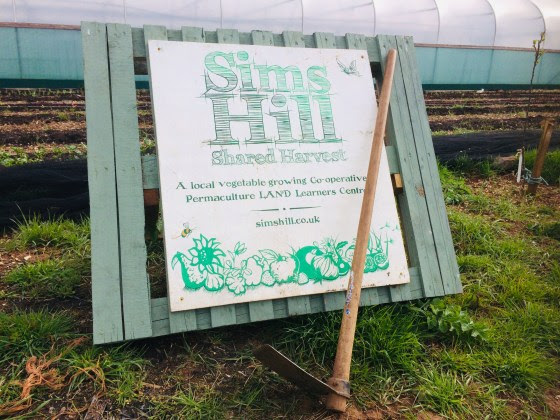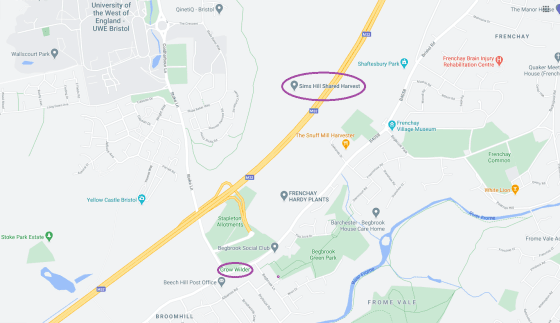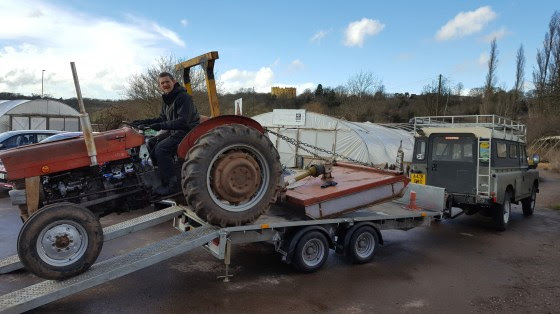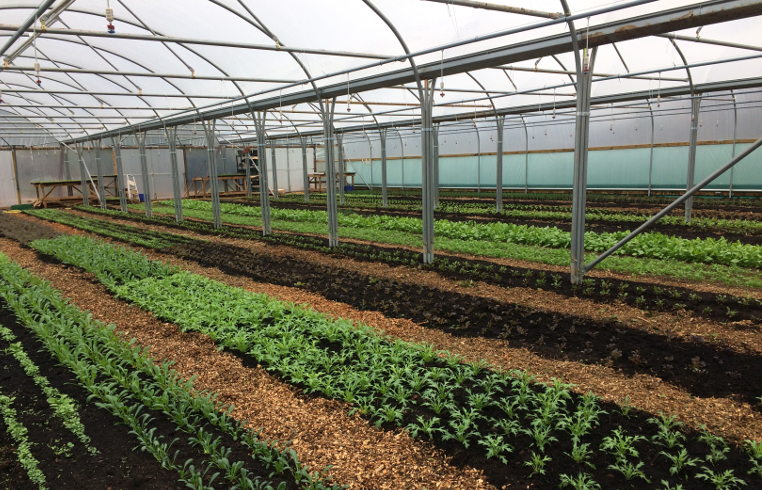We’re TEN this year! Hooray. Cause for celebration, we think. And to celebrate safely in the Covidsphere, we thought we’d give a whistle-stop tour of the history of Sims Hill, and talk a little bit about why we feel so passionate about what we do – local food and community engagement.
So, here’s an overview over pretty much everything you ever wanted to know about Sims Hill.

Who are we?
Sims Hill is a community-supported agriculture scheme up in the Stapleton/Frenchay area of Bristol. Community-supported agriculture (CSA) is literally what it says on the tin: a farming project that’s made possible by its members who contribute their skills, time and money in return for fresh, local vegetables grown following organic principles. Or, in more official terms: a partnership between farmers and consumers in which the responsibilities, risks and rewards of farming are shared.
So what does this look like in practice? At Sims Hill, members commit to paying a monthly membership contribution in return for either a full share of vegetables or a half share. So it’s a little bit like a veg box scheme, but not quite. For one, the CSA model is more loyalty-based, with members being in it ideally for the long haul because they want to lend their support to the project and see it flourish. For example, people don’t tend to cancel their share because of a lack of avocado or a surplus of beetroot in their bags, which is quite lucky really! What goes in the veg shares is whatever does well and is in season. This naturally means a huge variety of vegetables in spring and summer, and slightly less variety in the winter months – but still plenty of deliciously nutritious winter crops such as root veg and kale. In addition, Sims Hill offers the opportunity to get your hands dirty and gain a whole new appreciation for your wonky (and at times muddy) carrots by volunteering in the fields. This is currently every third Sunday of the month. There’s also the option of becoming a workshare member, which means rather than paying for your vegetables, you volunteer four hours of your time every week to help our growers get everything sown, grown and harvested in time.

Our previous grower Miriam and volunteer members demonstrating the “All for one and one for all” spirit!
How did it all start?
Sims Hill was set up in 2010 as a company limited by guarantee with co-operative rules by its six founding members. These included Tim Lawrence and James Adamson who became our first growers. The group had initial meetings for about a year and planned the structure of the project from scratch: what form the organisation should take, how the finances could be made to stack up, how to find the land to grow on, and what aims and goals to set.
Rather fortuitously, Bristol City Council at the time were looking for an opportunity to rent some land to a CSA and were happy to lease Sims Hill an approx. 7-acre field next to the M32. We also have a small amount of growing space just on the other side of the motorway on the Grow Wilder site, which is managed by the Avon Wildlife Trust. In total, the area of land we cultivate is just under 3 acres; this is because much of the big field acreage is made up of hedgerows, woodland, and access tracks. We are looking to expand our food growing area slightly – but that’s another update for another time.

Location of our fields in Stapleton/Frenchay
In its early stages, the fledgling project managed to raise enough money to get growing thanks to the generosity of its first members, who signed up as Pioneer Members and were willing to make regular payments for about six months before they started getting any vegetable returns on their investment.
It was agreed to make decisions by consensus between the Board and the members in members’ meetings. Day-to-day business decisions were taken in Board meetings, more significant ones were put to the membership at members’ meetings. This is still largely the way Sims Hill operates today. The objectives our members decided upon were for Sims Hill to
- provide naturally grown food;
- offer opportunities for education, work and recreation to the wider community;
- include and support people who are socially or economically marginalised; and
- build community life through creating a relationship with food and its production.

Members planting young seedlings
Where are we now?
Today, Sims Hill employs a farm manager and assistant grower. We have also started employing a trainee for each year’s growing season in order to pass on valuable skills, train up the next generation of growers and help provide decent employment opportunities for new entrants into farming. In 2020, the trainee placement was scuppered by Covid, but we hope to be offering the placement again in 2021. In order to supply about 140 Bristol households with fresh vegetables every week, our driver delivers all the veg shares to designated pick-up points around the city. Our members are then able to pick up their shares from a shed or shop near them.
Over the years we’ve connected with the wider community beyond our members in various ways, including hosting groups of children from local schools and community groups, and collaborating with students from the University of the West of England. From early 2017 to June 2019, we also ran a Community Food Centre project led by a brilliant community worker and a fabulous volunteer assistant. Based on the belief that eating good, nourishing and healthy food should be an option for everyone, from all walks of life and regardless of income, and that we all need connection with other people and benefit from the range of experience in a diverse group, the Community Food Centre model is designed to combine the therapeutic benefits of a community garden with a food bank. Over the space of two and a half years, they gave out about 300-odd bags of fresh, nutritious and pesticide-free vegetables to members of the group who came to help on the farm and have a facilitated, fun day of gardening, cooking and eating together. There was strong feedback that the project was helping people with stress levels and was inspiring them to eat better and cook more. Sadly, its funding was discontinued, but Sims Hill is hoping to attract fresh funding to keep doing community work of this or a similar kind. This has been tricky to take forward this year because of the pandemic, but plans are afoot – so watch this space!
Whilst we’re on the subject of money: Sometimes some grant funding or a crowdfunder is needed for big-ticket items – like our second-hand tractor and the new multi-span polytunnel, both of which have been a bit of a game changer in terms of available growing space and productivity!

Our very own tractor!

Our spick and span multi-span polytunnels
Growing Methods
All our vegetables are grown following organic principles, which means no artificial fertilisers or pesticides. Instead, we maintain fertility by ensuring crop rotation and growing green manures to replenish the soil. Another way to maintain and enhance soil health is to go no-dig. Yes, we are talking no digging, no forking, and no rotavating! Though admittedly the odd hand trowel is still required to stay on top of the more invasive weeds. And hoeing – a lot of hoeing! A no-dig system requires you to build up your beds by regularly adding organic matter (compost) on top, which improves soil structure and adds fertility. In February 2018, we started setting up no-dig beds in our polytunnels and subsequently expanded this to some outside areas, too.



From making the new no-dig beds to planting them up – all in a matter of weeks.

The no-dig area outside the polytunnel being made…

…and later on in all its glossy glory!
OK, but… why?
If all this sounds like a lot of work and you’re asking yourself: WHY do all of this when there’s perfectly good veg to be had on my local supermarket’s shelves? Well… quite a few reasons.
Reason #1: FUN!

…in all weathers and conditions.
And sometimes, after a long morning’s work, not even our own produce can compete with a huge sugary double-decker biscuit!


Reason #2: VARIETY!
I mean, when was the last time you saw a kohlrabi like this in the supermarket?

Reason #3: FOOD SECURITY!
Nowadays, what lands on our plates is tied into a globalised food system and therefore subject to all sorts of political whims, financial speculation, and built-in wastefulness. Therefore, it’s worth zooming out for a moment and looking at the importance of local and small-scale agriculture in a more global context.
It’s often said that small farmers produce 30-70% of the world’s food. The exact figure is in fact debated and very difficult to measure – because, for example, it depends on whether you include subsistence farmers, whether you categorise small farms only according to size or also according to output, and so on. What is clear however is that a sizeable chunk of the world’s population is being fed by small-scale farmers, who in doing so only use up 25% of the world’s resources. This is somewhat at odds with what most of us are constantly being told about the food system: that we need large-scale industrial food production to feed us. So what’s going on? Well, it’s all a bit complex really, but some of the shorter answers are: Only about a quarter of the food produced industrially (i.e. on a large scale) actually reaches people – the rest tends to be either wasted in meat production inefficiencies, lost in transport, storage and at the household level, or diverted to non-food products (like biofuels). Secondly, small farmers actually make up a huge proportion of all farmers worldwide: 80% of all farms are classed as small-scale farms. Plus, small farmers are generally more likely to produce actual food (rather than crops for biofuels, grain that is fed to animals, and so on). They also tend to produce more diverse crops than larger farms, which makes them more resilient (and more ecologically diverse, too).
It’s also worth pointing out that industrially produced food actually costs us more: For every dollar spent on food that is produced in a non-organic, large-scale monocultural way, it costs another two dollars to clean up the mess. This means we as taxpayers pick up the tab for externalities like increased antibiotic resistance, soil and water pollution due to pesticides and fertilisers, and such like.
Back here in the UK, with the current Covid crisis and a looming Brexit scenario, concerns over food security have recently been making a lot of headlines. There are still fears over food waste in customs queues, and let’s not forget that a weaker pound has been pushing food prices up since the EU referendum in 2016. This is because we import an awful lot of our food, and most of it from the EU. Only about 60% of food consumed in UK is actually produced here, which is a severe worry in terms of food security. The Covid pandemic has also thrown the fragility of our globalised food system into sharp relief. Here at Sims Hill, we have seen an unprecedented amount of enquiries from potential new members in 2020. Everyone is realising that growing food locally makes sense and is the resilient option.
The Landworkers’ Alliance have been producing a number of excellent reports and policy recommendations on how to better support small-scale food production in the UK, and they reckon that CSAs like Sims Hill can play a valuable role in strengthening our food security and encouraging the growth of domestic markets over imports.
Well, we obviously agree!

Reasons to root for local veg:
Sims Hill vegetables only have to travel about four miles down the road, which means a short supply chain and less fossil fuel usage – no refrigeration lorries required. Remember the Beast from the East in 2018 and how for several days, once vegetable-laden supermarket shelves turned bare? Well, our veg still made it safely to the various pickup points, and provided our members were able to make their way through the snow, their veg bags were there waiting for them.
We produce less food waste by growing and harvesting only the amount of vegetables needed for our members each week. So we are not speculatively stocking up shelves with food that will be put in the bin or go off before it even reaches someone’s home. This also means a massive reduction in plastic packaging. Any surplus veg we do have is sold wholesale to local shops.
Even ‘wonky’ vegetables get used. There are no beauty standards, which as a nice side effect makes for hilarious carrots. As long as it’s good quality and practicable, all our veg goes in members’ veg bags. Any surplus from their veg bags tends to get passed on rather than binned, because people know how much love and care has gone into growing their veg.
So as you can see…

…vegetables don’t get any more local than this!





